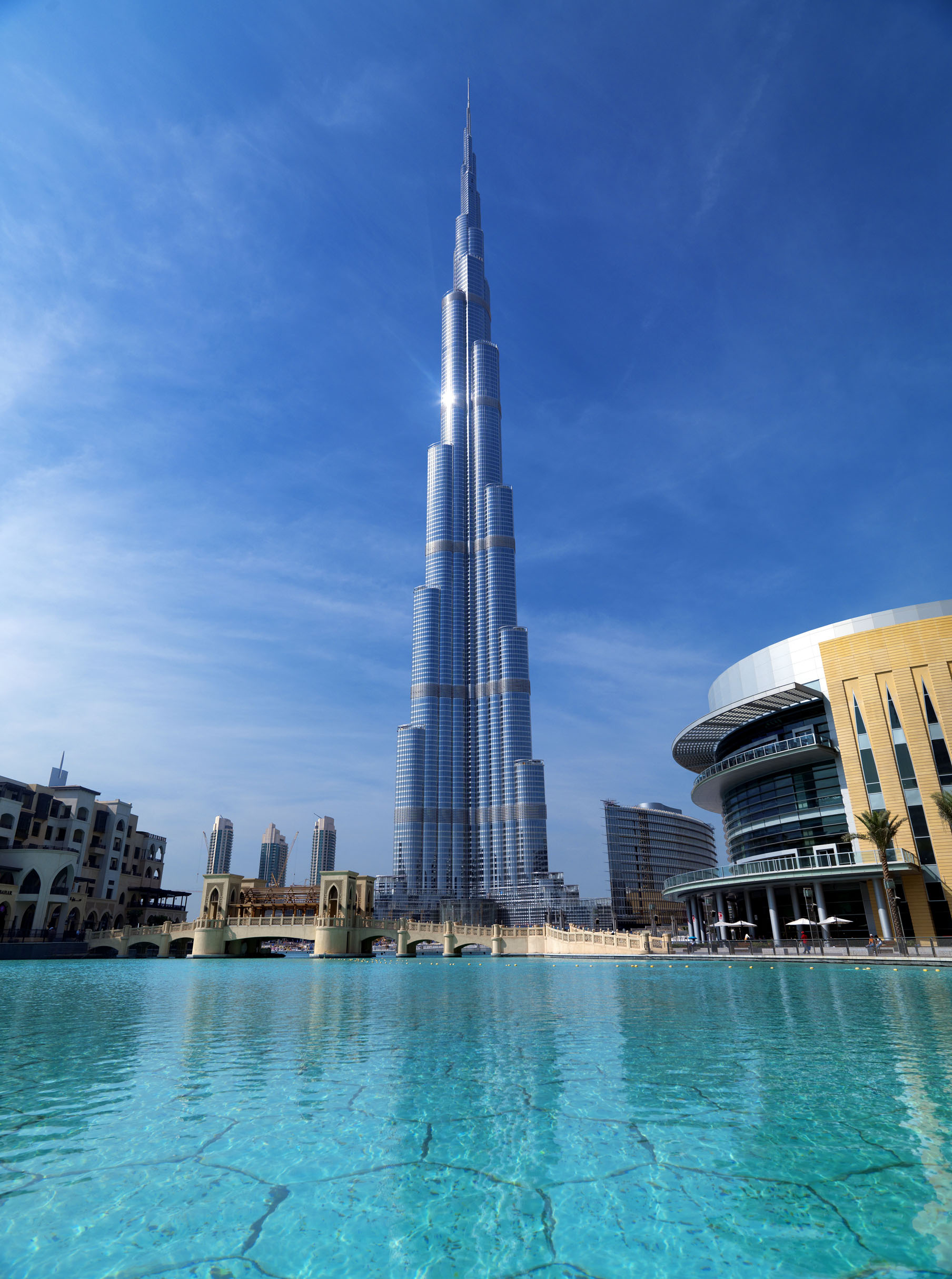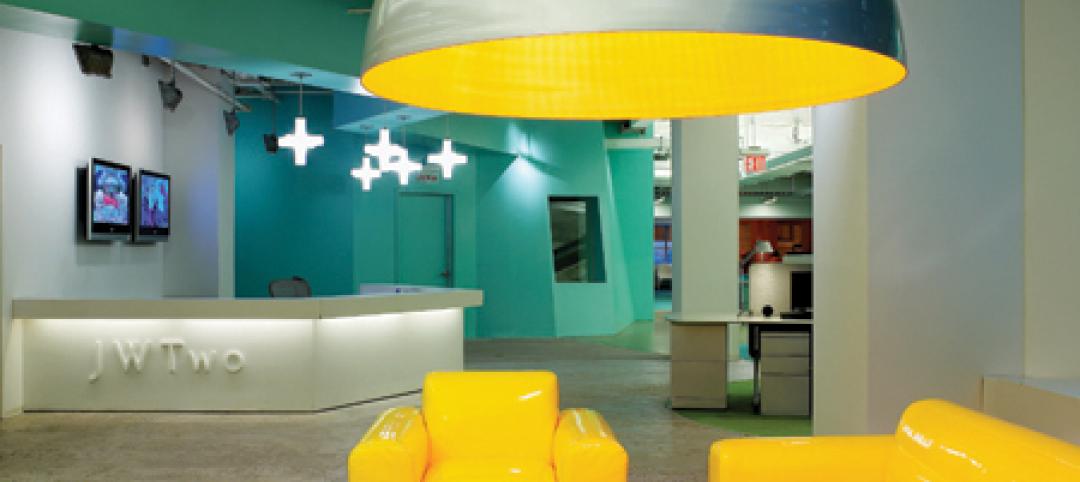The Burj Khalifa is part of an extraordinary 500 acre development called Downtown Dubai. The tower’s design is derived from patterning systems embodied in Islamic architecture, and also takes inspiration from the harmonious structure of the Hymenocallis plant, which is native to the region.
This iconic project breaks many records while overcoming the greatest of challenges and technical difficulties, not least of which are the wind forces dominating the structural design of the tower, the logistics of moving men and materials at extreme heights, and construction of the building envelope.
Addressing the environmental and technical challenges
As with any construction in the Middle East, Dow Corning’s technical experts were confronted with testing and specifying products that are able to withstand the rigors of high temperature, ultra-violet light, seismic activity and inclement weather conditions including sandstorms and high winds. In addition, large areas of the curtain wall, which in total is equivalent in size to 17 soccer fields, are positioned at extreme height, which in turn, brings a new set of technical challenges.
Key Participants
Adrian Smith, Skidmore, Owings & Merrill — Architect
Far East Aluminum, Hong Kong Arabian Aluminum, UAE — Structural Glazing Fabricators
White Aluminum, UAE — Insulating Glass Fabricator
Samsung Engineering & Construction — Main Contractor
Emaar Properties — Developer
Solving the pressure build-up problem
A total of 103,000 square meters of glass was used in the cladding panels, which are incorporated into a total facade area of 132,190 square meters. These advanced cladding panels maximize resistance against heat transmission from the sun and save energy through the use of sophisticated engineering techniques, which include high performance reflective glazing.
The unitized panels were interlocking on site and up to two stories tall. Being positioned at such high elevations, the risk of pressure buildup within the insulating glass units was alleviated through the design specification and Dow Corning 3362 Silicone Insulating Glass Sealant, was used as the secondary perimeter seal. Silicone application was carried out by White Aluminum Enterprise, who is a member of Dow Corning® Quality Bond—an initiative which provides technical training and support, designed to achieve excellence in quality control, quality assurance and standards of workmanship.
Products
Dow Corning 993 Silicone Structural Glazing Sealant
Dow Corning 3362 Silicone Insulating Glass Sealant
Dow Corning 798 Clean and Coldroom Silicone Sealant
In addition, Dow Corning 993 Silicone Structural Glazing Sealant was specified to bring additional secondary support of the insulating glass units, which were mechanically attached to the frame as the primary support. And, for sealing the exclusive bathrooms within the prestigious apartments, Dow Corning 798 Cold and Cleanroom Silicone Sealant was specified.
Click here to view a short animated presentation about how Dow Corning products and support helped Burj Khalifa become a reality.
Or, to learn more about the Dow Corning products featured in this case study, as well as the many other proven materials for the construction industry, please visit us here. To speak to your nearest Dow Corning representative, visit dowcorning.com/ContactUs. +
Related Stories
| Aug 11, 2010
Florida mixed-use complex includes retail, residential
The $325 million Atlantic Plaza II lifestyle center will be built on 8.5 acres in Delray Beach, Fla. Designed by Vander Ploeg & Associates, Boca Raton, the complex will include six buildings ranging from three to five stories and have 182,000 sf of restaurant and retail space. An additional 106,000 sf of Class A office space and a residential component including 197 apartments, townhouses, ...
| Aug 11, 2010
Restoration gives new life to New Formalism icon
The $30 million upgrade, restoration, and expansion of the Mark Taper Forum in Los Angeles was completed by the team of Rios Clementi Hale Studios (architect), Harley Ellis Devereaux (executive architect/MEP), KPFF (structural engineer), and Taisei Construction (GC). Work on the Welton Becket-designed 1967 complex included an overhaul of the auditorium, lighting, and acoustics.
| Aug 11, 2010
Best AEC Firms to Work For
2006 FreemanWhite Hnedak Bobo Group McCarthy Building Companies, Inc. Shawmut Design and Construction Walter P Moore 2007 Anshen+Allen Arup Bovis Lend Lease Cannon Design Jones Lang LaSalle Perkins+Will SmithGroup SSOE, Inc. Timothy Haahs & Associates, Inc. 2008 Gilbane Building Co. HDR KJWW Engineering Consultants Lord, Aeck & Sargent Mark G.
| Aug 11, 2010
High-Performance Workplaces
Building Teams around the world are finding that the workplace is changing radically, leading owners and tenants to reinvent corporate office buildings to compete more effectively on a global scale. The good news is that this means more renovation and reconstruction work at a time when new construction has stalled to a dribble.
| Aug 11, 2010
Great Solutions: Business Management
22. Commercial Properties Repositioned for University USE Tocci Building Companies is finding success in repositioning commercial properties for university use, and it expects the trend to continue. The firm's Capital Cove project in Providence, R.I., for instance, was originally designed by Elkus Manfredi (with design continued by HDS Architects) to be a mixed-use complex with private, market-...
| Aug 11, 2010
Nurturing the Community
The best seat in the house at the new Seahawks Stadium in Seattle isn't on the 50-yard line. It's in the southeast corner, at the very top of the upper bowl. "From there you have a corner-to-corner view of the field and an inspiring grasp of the surrounding city," says Kelly Kerns, project leader with architect/engineer Ellerbe Becket, Kansas City, Mo.
| Aug 11, 2010
AIA Course: Historic Masonry — Restoration and Renovation
Historic restoration and preservation efforts are accelerating throughout the U.S., thanks in part to available tax credits, awards programs, and green building trends. While these projects entail many different building components and systems, façade restoration—as the public face of these older structures—is a key focus. Earn 1.0 AIA learning unit by taking this free course from Building Design+Construction.
| Aug 11, 2010
BIM adoption tops 80% among the nation's largest AEC firms, according to BD+C's Giants 300 survey
The nation's largest architecture, engineering, and construction companies are on the BIM bandwagon in a big way, according to Building Design+Construction's premier Top 50 BIM Adopters ranking, published as part of the 2009 Giants 300 survey. Of the 320 AEC firms that participated in Giants survey, 83% report having at least one BIM seat license in house, half have more than 30 seats, and near...
| Aug 11, 2010
World's tallest all-wood residential structure opens in London
At nine stories, the Stadthaus apartment complex in East London is the world’s tallest residential structure constructed entirely in timber and one of the tallest all-wood buildings on the planet. The tower’s structural system consists of cross-laminated timber (CLT) panels pieced together to form load-bearing walls and floors. Even the elevator and stair shafts are constructed of prefabricated CLT.
| Aug 11, 2010
Integrated Project Delivery builds a brave, new BIM world
Three-dimensional information, such as that provided by building information modeling, allows all members of the Building Team to visualize the many components of a project and how they work together. BIM and other 3D tools convey the idea and intent of the designer to the entire Building Team and lay the groundwork for integrated project delivery.








